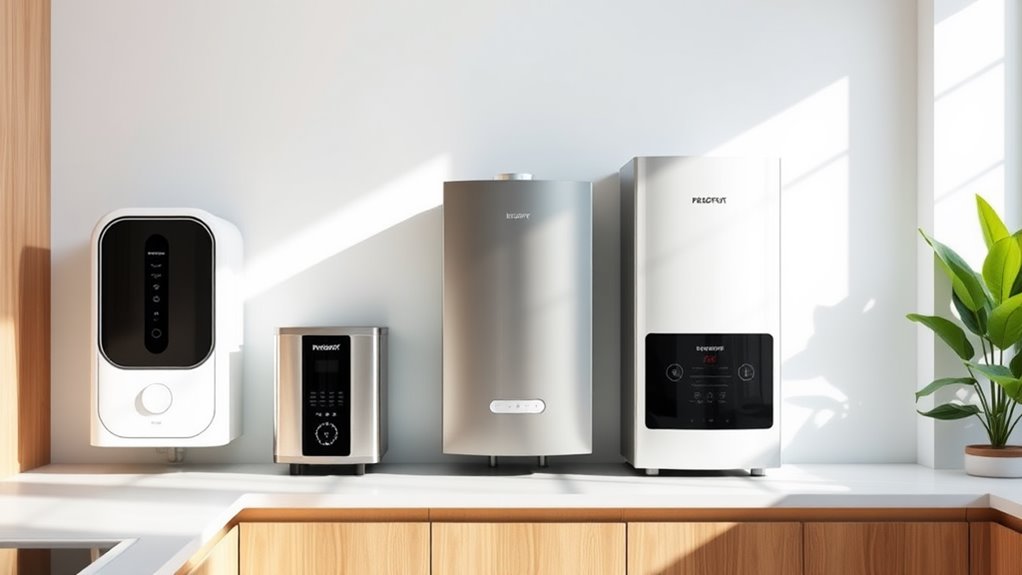When choosing the best boiler in the UK, consider the type that suits your home: combi, system, or conventional. Evaluate key features like capacity, efficiency ratings, and smart technology integrations, which enhance energy savings. Combi boilers are great for smaller spaces, while system boilers serve larger households. Always factor in installation and maintenance costs too. You'll discover valuable insights into top brands and models that meet your needs as you explore further.
Key insights
- Boiler Type: Choose between combi, system, or conventional boilers based on your home's size and hot water needs for optimal performance.
- Energy Efficiency: Look for A-rated boilers with over 90% efficiency to reduce energy bills and environmental impact.
- Fuel Type: Consider gas, oil, or electric options; gas is often the most cost-effective and efficient choice in the UK.
- Smart Features: Opt for boilers with smart technology for remote monitoring and predictive maintenance, enhancing energy efficiency and convenience.
- Professional Installation: Ensure proper installation by qualified installers to comply with safety standards and achieve peak boiler performance.
Understanding Boiler Types: Combi, System, and Conventional
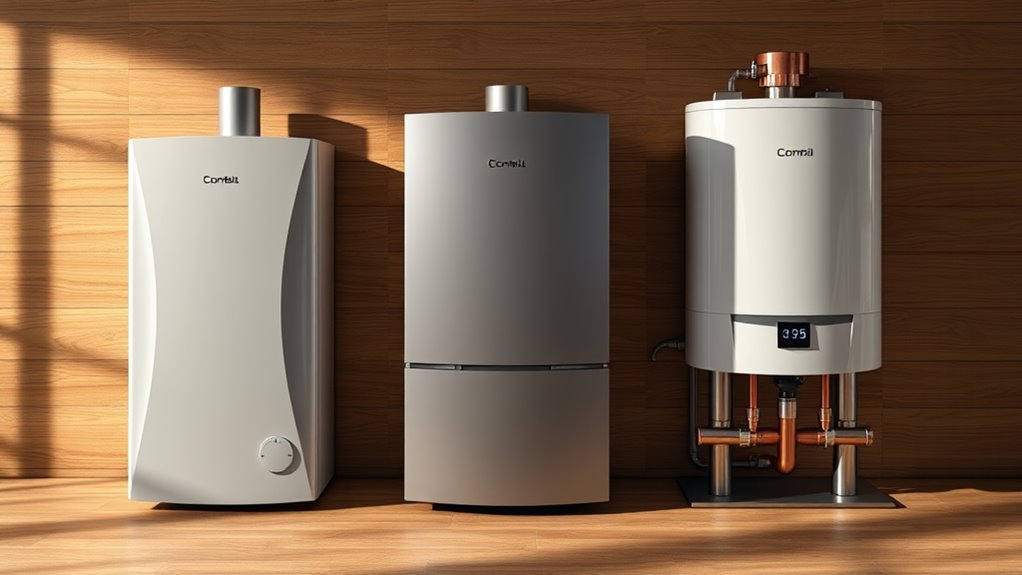
When it comes to choosing a boiler, understanding the three main types—combi, system, and conventional—is essential for making an informed decision. Combi boilers are compact and provide both heating and hot water on demand, making them ideal for smaller spaces. System boilers, on the other hand, work with a separate hot water cylinder and are suitable for homes with higher hot water needs, maintaining consistent pressure across multiple outlets. Conventional boilers, also known as heat-only boilers, require both a hot water cylinder and a cold water tank, making them more suited for larger properties with extensive heating systems. Knowing these boiler types helps you select the right solution based on your home's size and hot water requirements. Additionally, consulting with qualified installers ensures that your chosen boiler meets local building codes and safety regulations.
Key Features to Consider When Choosing a Boiler
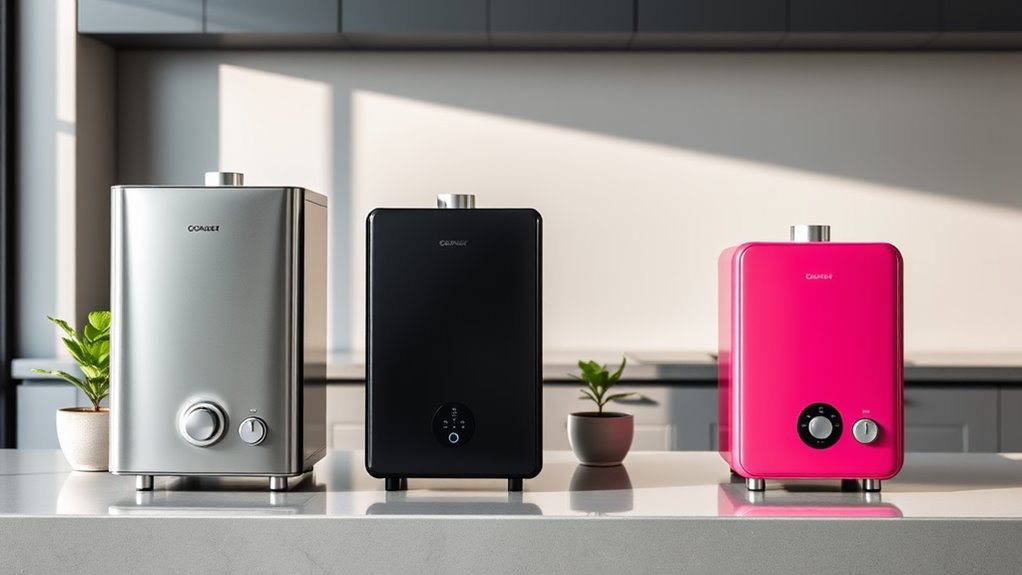
Choosing the right boiler involves considering several key features that can significantly impact efficiency and overall performance. First, evaluate the boiler capacity, which should match your household's heating and hot water demands. A unit that's too small won't adequately heat your space, while one that's too large can lead to energy waste. Next, consider the fuel type; options include gas, oil, and electric. Each fuel type comes with distinct efficiency levels, costs, and environmental impacts. Additionally, think about the boiler's size and installation requirements, as well as the availability of parts and service for maintenance. By carefully evaluating these features, you'll make a more informed choice that suits your needs and enhances your home's heating system. Regular commercial boiler service ensures safe and efficient operation, which further contributes to optimal performance.
Energy Efficiency Ratings and Their Importance
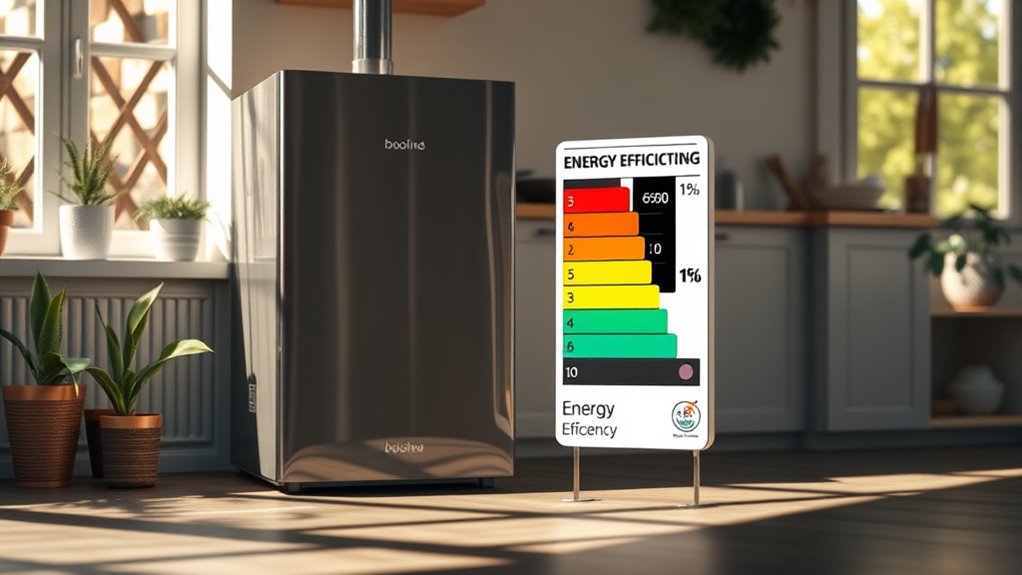
Energy efficiency ratings play an essential role in selecting a boiler, directly influencing your energy bills and environmental impact. These ratings, often expressed as an energy rank, indicate how effectively a boiler converts fuel into heat. A higher rating means better efficiency, which translates to lower running costs and reduced carbon emissions. When making an efficiency comparison between different models, it's important to pay attention to the annual fuel utilization efficiency (AFUE) percentage. This figure helps you gauge potential savings over time. Selecting a boiler with a superior energy efficiency rating not only benefits your wallet but also contributes to a more sustainable future. Ultimately, understanding these ratings empowers you to make an informed decision. Additionally, considering energy-efficient heating solutions like commercial heat pumps can further enhance your building's overall energy performance.
Top Combi Boilers in the UK Market
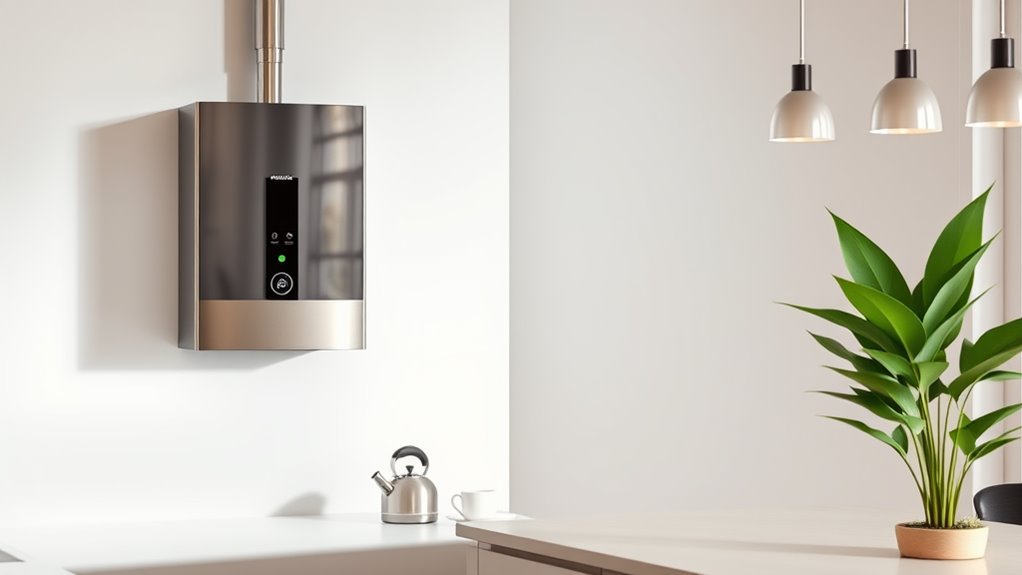
As you explore the UK market for the best combi boilers, you'll discover a variety of options that cater to different household needs and budgets. Combi boilers are popular due to their compact design and efficiency, providing both heating and hot water on demand—two key combi boiler benefits. Leading models, such as the Viessmann Vitodens and Worcester Bosch Greenstar, offer exceptional performance and reliability. However, it is crucial to evaluate combi boiler drawbacks, including limited hot water supply for larger households and dependency on water pressure. When selecting a combi boiler, assess your home's size and hot water requirements to guarantee you choose a model that meets your specific needs while maximizing energy efficiency. Regular maintenance of these systems is essential for optimal condition and to prevent costly repairs.
Best System Boilers for Larger Homes

For larger homes that require a consistent and robust supply of hot water, system boilers present a compelling solution. These boilers, designed to provide high heating capacity, can efficiently meet the demands of multiple bathrooms and heating zones. When considering the best system boilers for your home, you'll find that leading brands like Worcester Bosch, Vaillant, and Ideal stand out. They offer models with impressive efficiency ratings and advanced features, ensuring you get reliable performance. Look for options that provide a minimum output of 25kW to handle larger heating needs effectively. Investing in a quality system boiler not only enhances comfort but can also lead to long-term savings on energy bills, making it a smart choice for any homeowner. Additionally, regular commercial power flushing of your heating system can further improve efficiency and prolong the lifespan of your boiler.
Conventional Boilers: When Are They the Right Choice?
While many homeowners may lean towards modern system or combi boilers, conventional boilers can still be the right choice in specific situations. If you have a large home with multiple bathrooms, conventional boilers offer impressive hot water output, a key advantage. They're also generally easier to replace and often compatible with existing heating systems, making installation more straightforward. However, there are conventional boiler disadvantages to evaluate, such as requiring more space for the cylinder and tank, and they may not be as energy-efficient as newer models. If you prioritize reliability and have the necessary space, a conventional boiler could be ideal for your home, providing consistent heating and hot water when needed. Additionally, proper regular maintenance is essential to prolong the lifespan and efficiency of the heating system.
Installation and Maintenance Costs to Factor In
When considering a new boiler, it's vital to factor in both installation and maintenance costs, as these can greatly impact your overall budget. Installation costs can vary considerably depending on the type of boiler you choose and the complexity of the installation process. Expect to spend anywhere from £1,500 to £3,000, including labor and materials.
After installation, regular maintenance is important to guarantee efficiency and longevity. Maintenance tips include scheduling annual servicing with a certified technician and promptly addressing any issues. This proactive approach can prevent costly repairs down the line. Additionally, consider setting aside funds for potential repairs or replacements, as these can arise unexpectedly. By planning ahead, you'll keep your boiler running smoothly and efficiently. Furthermore, ensure to monitor the boiler's pressure gauge to prevent issues such as low water pressure that can lead to error codes like E119.
Reviews of Leading Boiler Brands
Choosing the right boiler brand is just as important as understanding installation and maintenance costs. Leading brands like Worcester Bosch and Vaillant are often praised for their reliability and efficiency, backed by strong brand reputations. When selecting a boiler, consider the warranty offered; many top brands provide extensive boiler warranties, which can cover parts and labor for several years. This not only guarantees peace of mind but also reflects the manufacturer's confidence in their product. Ideal Logic and Baxi are also worth noting, as they balance affordability with good performance. Research customer reviews and performance ratings to gain insights into real-world experiences, helping you make an informed decision that meets your heating needs effectively. Additionally, ensuring that the boiler is up to safety standards is crucial for compliance and safety in your property.
The Role of Smart Technology in Modern Boilers
Smart technology is transforming modern boilers, enhancing energy efficiency and providing you with remote control capabilities. You can now monitor and adjust your heating system from anywhere, optimizing performance and reducing costs. Additionally, predictive maintenance solutions can alert you to potential issues before they become significant problems, ensuring your boiler runs smoothly. Regular maintenance helps prevent error codes and enhances boiler longevity, contributing to overall efficiency.
Energy Efficiency Improvements
Modern boilers can achieve up to 30% greater energy efficiency thanks to advancements in smart technology. These upgrades not only save you money but also align with government incentives aimed at promoting eco-friendly practices. Here are some energy-saving tips to take into account:
- Automated Scheduling: Set your heating to operate only when needed, maximizing energy use.
- Remote Monitoring: Track boiler performance in real-time to identify inefficiencies.
- Adaptive Learning: Smart boilers adjust settings based on your habits, ensuring peak performance.
- Integration with Renewable Energy: Combine with solar panels or heat pumps for enhanced efficiency.
Additionally, understanding error codes can help you quickly address any issues that may arise, ensuring your boiler operates efficiently and effectively.
Remote Control Features
As technology advances, remote control features in boilers have become essential for enhancing user convenience and operational efficiency. These smart technologies allow you to manage your heating system remotely through a user-friendly interface, whether you're at home or away. You can adjust settings, schedule heating times, and monitor energy usage directly from your smartphone or tablet. The remote control benefits include improved comfort, as you can pre-heat your home before arriving, and potential energy savings by optimizing your boiler's performance. In addition, many modern boilers provide real-time feedback, allowing you to address issues promptly. Overall, integrating these remote features into your boiler system not only simplifies management but also enhances your overall heating experience.
Predictive Maintenance Solutions
Remote control features set the stage for more advanced innovations in boiler technology, particularly predictive maintenance solutions. By utilizing predictive analytics, you can enhance your boiler's efficiency and reliability. Here's how these smart technologies work for you:
- Data Collection: Sensors gather operational data in real-time.
- Predictive Analytics: Algorithms analyze data patterns to forecast failures before they occur.
- Maintenance Scheduling: You receive alerts for ideal maintenance times, minimizing downtime.
- Cost Savings: Early detection of issues reduces repair costs and extends equipment lifespan.
Embracing predictive maintenance allows you to proactively manage your boiler, ensuring it runs smoothly and efficiently, ultimately leading to a more reliable heating system.
Making the Final Decision: What to Look For
When you're choosing a boiler, efficiency ratings should be a top priority, as they directly impact your energy costs. Consider the installation process and the long-term maintenance requirements, as these factors influence both convenience and performance. By focusing on these elements, you'll make a more informed decision that suits your needs.
Efficiency Ratings
Understanding efficiency ratings is essential for making an informed decision when selecting a boiler. High boiler efficiency not only reduces energy bills but also minimizes environmental impact. When evaluating options, consider the following key factors:
- A-Rated Boilers: Look for models with an A rating, indicating over 90% efficiency.
- Seasonal Efficiency: Check the Seasonal Energy Efficiency Rating (SEER) for a more realistic efficiency measure throughout the year.
- Modulation Ratio: A higher modulation ratio allows the boiler to adjust its output more efficiently based on demand.
- Energy Source: Different fuels have varying efficiencies; gas and electric boilers often rank higher than oil.
Installation and Maintenance
After selecting a boiler with high efficiency ratings, the next step involves considering installation and maintenance. Proper boiler installation is essential for peak performance and safety. Make sure you hire a qualified professional who follows local regulations and manufacturer guidelines. Discuss placement, as it affects efficiency and access for maintenance.
For ongoing care, implement these maintenance tips: schedule annual servicing to detect issues early, check pressure regularly, and bleed radiators to improve heat distribution. Monitor for unusual noises, as they can indicate problems. Keeping an eye on your system not only extends its lifespan but also maintains efficiency. By prioritizing installation and maintenance, you'll guarantee your boiler operates smoothly and reliably for years to come.
Frequently Asked Questions
How Long Does a Typical Boiler Last?
A typical boiler lasts around 10 to 15 years, but several factors can influence its lifespan. Regular maintenance, like annual servicing and prompt repairs, can greatly extend its life. You should also consider the type of boiler, usage patterns, and water quality. To optimize performance, keep an eye on pressure levels and bleed radiators as needed. Following these boiler maintenance tips will help guarantee your system runs efficiently for as long as possible.
What Are the Signs My Boiler Needs Replacing?
You'll notice signs your boiler needs replacing when it shows declining boiler efficiency, like inconsistent heating or rising energy bills. If it's over 15 years old, it may not meet current standards. Look for leaks, strange noises, or frequent breakdowns—these indicate potential failure. Replacement costs can vary, but investing in a new model can save you money in the long run by improving efficiency and reducing repair expenses.
Can I Install a Boiler Myself?
You might think about DIY installation for your boiler, but it's essential to take into account boiler safety first. Installing a boiler requires specific knowledge of gas and plumbing regulations, and any mistakes could lead to serious hazards. If you're not fully qualified, it's best to hire a professional. They guarantee compliance with safety standards and local codes, protecting you and your home from potential risks associated with improper installation.
How Often Should I Service My Boiler?
You should service your boiler at least once a year to guarantee peak performance and safety. Regular boiler maintenance helps identify potential issues before they become serious problems. The service frequency can depend on your boiler's age and usage, but annual checks are generally recommended. By staying on top of servicing, you'll not only extend your boiler's lifespan but also improve energy efficiency, ultimately saving you money on utility bills.
Are There Any Government Grants for Boiler Replacements?
Yes, there are government grants available for boiler replacements, particularly aimed at improving energy efficiency. You can explore schemes like the Energy Company Obligation (ECO) and the Renewable Heat Incentive (RHI). These programs often provide financial support for upgrading to more efficient heating systems. Check your eligibility and the specific requirements, as the availability of boiler grants can vary based on your circumstances and location.
Summary
To summarize, choosing the right boiler for your needs involves understanding the different types available and evaluating key features like energy efficiency and installation costs. Whether you opt for a combi, system, or conventional boiler, prioritize reliable brands known for performance and support. Don't overlook the benefits of smart technology, which can enhance efficiency and user control. By considering these factors, you can make an informed decision that guarantees comfort and efficiency in your home.

